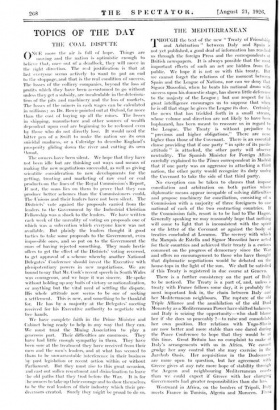TOPICS OF TIIE DAY
THE COAL DISPUTE
oNcE more the air is full of hope. Things are moving and the nation is optimistic enough to believe that, once out of a deadlock, they will move in the right direction. The re...11 justification is that at last everyone seems actively to want to put an end to the stoppage, and that is the real condition of success.
The losses of the colliery companies, beyond the loss of profits which they have been aveustomed to go without unless they get a subsidy, are incalculable in the deteriora- tion of the pits and machinery and the loss of markets. The losses of the miners in cash wages can be calculated in millions; as Dr. Bowie pointed out at Oxford, far more than the cost of buying up all the mines. The losses in shipping, manufacture and other sources of wealth dependent upon coal are beginning to be reckoned even by those who do not directly lose. It would need the bitter pen of a Swift to make the nation see its own suicidal madness, or a Coleridge to describe England's prosperity gliding down the river and cutting its own throat.
The owners have been silent. We hope that they have not been idle but are thinking out ways and means of making the new negotiations successful, as well as giving scientific consideration to new developments for the getting, treating and marketing of raw coal or coal products on the lines of the Royal Commission's Report, If not, the onus lies on them to prove that they can produce better schemes than the Conunissioners could. The Unions and their leaders have not been silent. The Districts' vote against the proposals carried from the leaders to the Government by the Industrial Christian Fellowship was a shock to the leaders. IVe have written each week of the unreality of voting on proposals one of which was a subvention which everyone knew was not available. But plainly the leaders thought it good tactics to take sonic proposals to the Government, even impossible ones, and so put on to the Government the onus of having rejected something. They made hectic offers to get the effect of the Districts' voting reversed, to get approval of a scheme whereby another National Delegates' Conference should invest the Executive with plenipotentiary powers in new negotiations. We are bound to say that Mr. Cook's recent speech in South Wales was courageous, and we hope it was sincere. He spoke without holding up any baits of victory or nationalization, or anything but the vital need of settling the dispute.
His whole attitude now seems to be one of seeking a settlement. This is new, and something to be thankful for. He has by a majority at the Delegates' meeting received for his Executive authority to negotiate with free hands.
We have complete faith in the Prime Minister and Cabinet being ready to help in any way that they can. We must trust the Mining Association to play a generous part. Their difficulties are enormous. They have had little enough sympathy in them. They have been sore at the treatment they have received from their men and the men's leaders, and at what has seemed to Ilium to be unwarrantable interference in their business by past legislation or recent action within or without Parliament. But they must rise to. this great occasion, and east out sullen resentment and disinclination to leave the old paths that they trod before the War. It is for the owners to take up their courage and to show themselves to be the real leaders of their industry which their pre- decessors created. Surely they might be proud to do so.


































 Previous page
Previous page